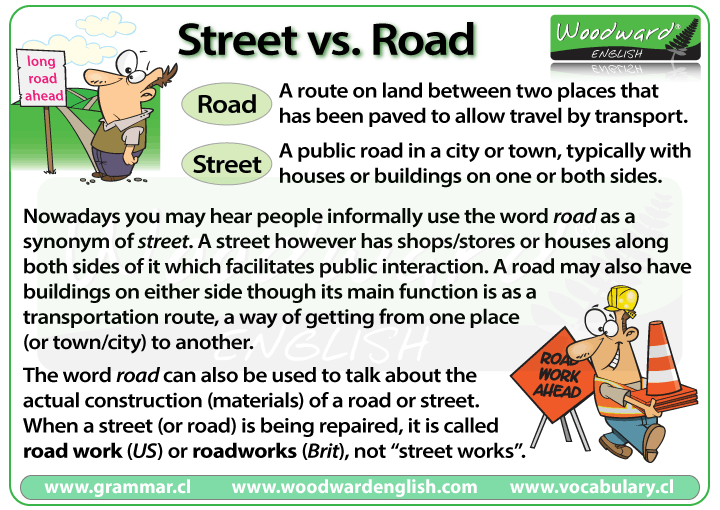Street vs. Road
Learn English Vocabulary
In your town or city you may wonder why some streets are called streets and others are called roads. Historically there was a difference between a street and a road which is still relevant today.
What is a street?
Street = a paved public road that only appears in a city or town, not in rural areas.
Usually there are shops/stores or houses along both sides of a street which facilitates public interaction.
Example sentences with Street:
- The opened a store on Main Street.
- It was 6pm and the streets were busy with people going home from work.
- Make sure you look both ways when you cross the street.
- After the guilty verdict, there were riots on the streets.
What is a road?
Road = a route or way on land between two places that has been paved to allow travel by transport.
According to the OECD, a road is "a path (travelled way) using a stabilized base other than rails or air strips open to public traffic, primarily for the use of road motor vehicles running on their own wheels,"
Traditionally a road was a way to travel between two points, usually other towns or distant places. Over time, a road that once connected two towns or villages that were close to each other is still called a road even though now those two towns or villages became part of the same larger city. That is why roads are normally long and important routes in a city.
Example sentences with Road:
- Unfortunately there are many potholes on the road.
- The farm is two miles south of the main road.
- Two roads diverged in a wood, and I - I took the one less traveled by, and that has made all the difference. (extract from The Road Not Taken by Robert Frost).
The difference between Street and Road
Nowadays you may hear people informally use the word road as a synonym of street. This is fine and people will understand what you are talking about if you use either of the words. A street however normally has shops/stores or houses along both sides of it which facilitates public interaction. A road may also have buildings on either side though its main function is as a transportation route, a way of getting from one place to another, especially between towns. Outside of the city they are called roads.
Road can also be used to talk about the actual construction (materials) of a road or street. When a street (or road) is being repaired, it is called road works, not street works.
- Make sure you look both ways when you cross the street. (Here you could also use road instead of street)
- Look at all of those potholes on the road.
- I think I will be late to work because of all the road works on the way.

What is an avenue?
Avenue = a straight street (or road) with trees planted along both sides. Avenues are typically wider than streets, sometimes having more lanes and therefore more traffic.
In some cities in the US that are based on a grid system, streets and avenues are the same with the difference that streets run from west to east while avenues run north to south. Note that in other US cities this may be reversed and the streets go north to south and the avenues from west to east. Thus in city centers (downtown), you will almost never find two avenues that intersect.
Example sentences with Avenue:
- It's on the corner of Patriot Street and Sixth Avenue.
- The main avenue that runs through Santiago changes its name four times.
- The spent the afternoon strolling along the tree-lined avenue.
- The widest avenue in the world is in Buenos Aires, Argentina.
Alleys, Boulevards, Lanes, and more
An alley is a narrow passageway between or behind buildings. Often there is only enough space for a one vehicle in an alley or for none at all (just for pedestrians).
A boulevard is a wide tree-lined street, similar to an avenue though with a grass median strip (with trees and/or grass).
A court is a short street that ends in a cul-de-sac.
A cul-de-sac is a street that is closed at one end. Sometimes the end of the street has a large round paved area (from above it has the shape of an old light bulb) making it easier for vehicles to turn around and go back out.
A highway is a major public road, usually connecting towns and cities. In some countries UK, NZ etc, the word motorway is used instead of highway.
A lane is a short narrow street usually without a sidewalk/footpath.
A path is not normally paved and is dedicated to pedestrians, not vehicles.
A pedestrian street is a street that has been closed to road vehicles. They are paved and you can only walk along them.
Giving Directions
When giving directions, sometimes people leave out the Street part of a street name. For example:
- Go along Churchill (Street) and once you get to Piccadilly (Street), turn right.
Next Activities
See our vocabulary notes about Places in a City.
If you found this English Vocabulary about Street vs. Road interesting or useful, let others know about it.
